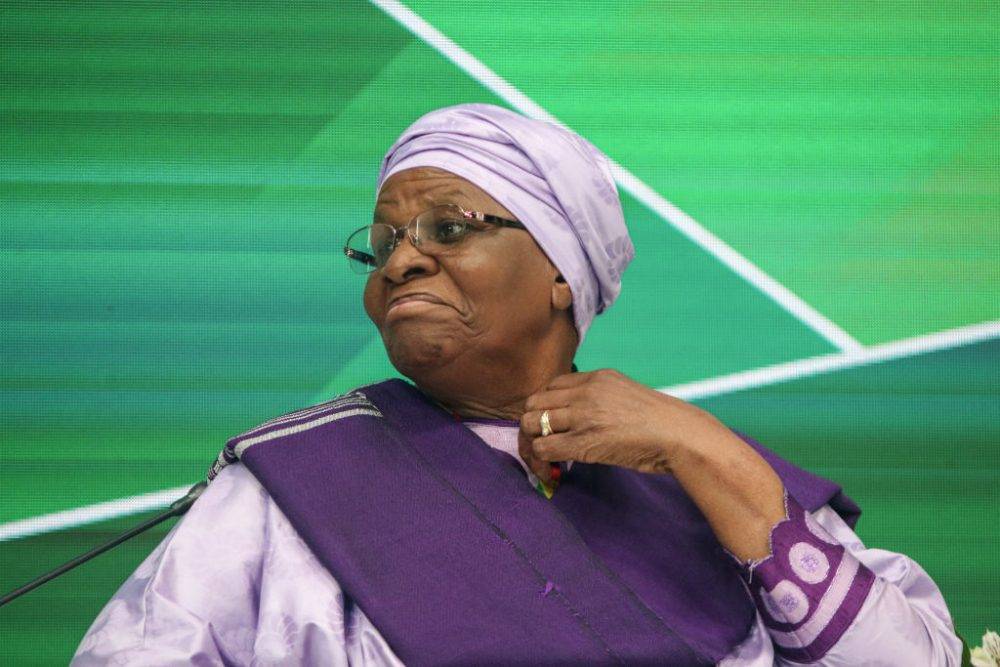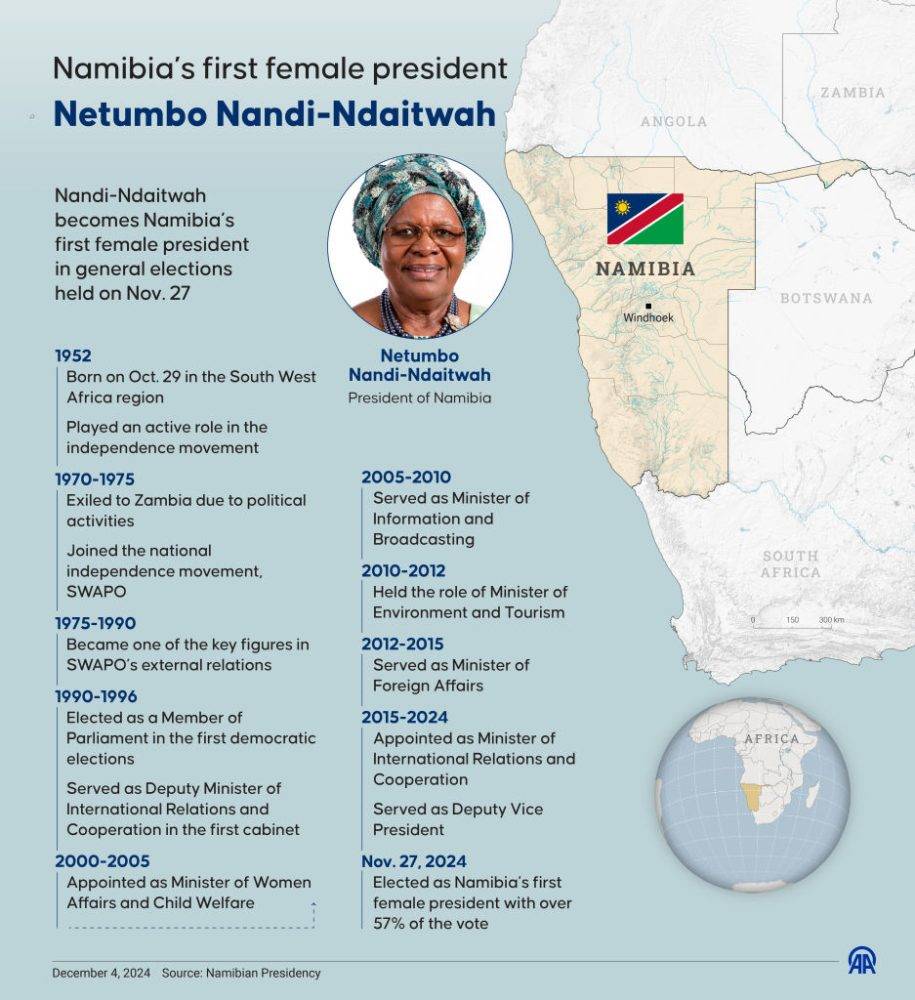
President-elect Netumbo Nandi-Ndaitwah. (Photo by Maksim Konstantinov/SOPA Images/LightRocket via Getty Images)
Namibia’s 2024 presidential and National Assembly elections encapsulated both remarkable strides and glaring inefficiencies. Although voter turnout was commendable, logistical inadequacies and allegations of irregularities raised questions about the state of Namibia’s democracy. These elections were not just a routine exercise in governance — they represented a test of the country’s institutional resilience, public confidence and commitment to democratic principles.
The elections stood out for the active involvement of citizens, reflecting a society invested in shaping its future. More than one million Namibians out of 1.3 million registered voters turned up at polling stations, reinforcing the importance of electoral participation in sustaining democracy. Voters in both urban and rural areas braved long queues to exercise their right to vote. Their determination reinforced a collective desire for change and progress.
But this enthusiasm was overshadowed by logistical problems. The introduction of the “vote anywhere” policy, designed to improve accessibility, exposed operational weaknesses. Integrated Mobile Voter Registration Systems malfunctioned, ballot papers ran out and some polling stations opened late, delaying the process for many voters. These issues were compounded by the failure of the Electoral Commission of Namibia (ECN) to adequately manage these complexities, raising doubts about its operational competence.
Moreover, outsourcing ballot production to South Africa, despite procuring the ballots well before the elections, showed Namibia’s dependence on external suppliers. This reliance undermined public confidence in the process. Namibia, as a sovereign nation, must prioritise the development of local capacities to independently manage its electoral processes.
Such errors disproportionately affected rural and marginalised voters, many of whom already face systemic barriers to participation.
Beyond operational shortcomings, allegations of misconduct and breaches of the Electoral Act cast a shadow over the elections. Political parties accused each other of spreading misinformation and unfair practices, fuelling public discontent. These accusations exposed the fragility of Namibia’s political maturity; campaigns often prioritised propaganda over substantive policy debates. Some political parties copied others’ manifestos, undermining genuine political discourse and complicating the choices available to voters.
More than 15,000 votes — about 1.4% of the total — were rejected. Although this percentage may seem small, it represents thousands of citizens whose voices were effectively silenced. Many of these rejections were a result of voter errors, an indicator of inadequate civic education. The ECN’s outreach efforts failed to address the knowledge gap, particularly in rural areas where understanding of electoral processes remains limited.
“Opposition parties” further questioned the fairness of the process, alleging irregularities in vote counting, ballot shortages at polling stations and the tabulation process. Although legal mechanisms exist to address these disputes, such as the electoral court, the electoral tribunal and the supreme court, the damage to public trust is far more difficult to repair. Transparent and efficient electoral systems are essential to maintaining credibility, and Namibia must work toward rebuilding this foundation.
The election results reaffirmed the dominance of Swapo, which retained the presidency (with president-elect Netumbo Nandi-Ndaitwah securing 638,560 votes, or 57.31%) and a majority in the National Assembly (583,300 votes, or 54%, (51 seats from 63 seats in 2029). But the political landscape is shifting, as evidenced by the growing influence of opposition parties such as the Independent Patriots for Change (IPC) (20 seats) and Affirmative Repositioning (AR) (six seats). These parties capitalised on the dissatisfaction of younger and urban voters, signalling a desire for alternatives to Swapo’s long-standing rule.

The persistence of a dominant-party system presents opportunities and risks. Swapo’s experience in governance provides stability in uncertain times. But its overwhelming control risks fostering complacency and resistance to change. Namibia’s challenges — youth unemployment, inadequate housing (with a backlog of about 300,000 housing units only for those who have already applied), and corruption-demand innovative solutions that may not emerge within the constraints of one-party dominance unless strategic planning and management are enforced.
Parties with fewer seats, despite their electoral gains, may continue to struggle for meaningful representation, as witnessed in previous years. Namibia’s proportional representation system, although designed to ensure inclusivity, has not translated into significant influence for these parties. Strengthening their roles through policy changes and enhanced parliamentary practices is needed to ensure a more balanced and representative democracy.
Amid these issues, Namibia’s civil society emerged as a beacon of hope. Organisations such as the Namibia Institute for Democracy (NID) played a critical role in voter education, monitoring the electoral process and advocating for transparency. Its efforts complemented the work of local and international observers, who provided impartial assessments of the elections.
But civic education campaigns must be more widespread and targeted, particularly in remote areas where access to information is limited. Educational institutions can also play a role by incorporating lessons on democracy and governance into their curricula. Such initiatives will empower future generations to participate more effectively in the democratic process.
Additionally, responsible journalism is essential for countering misinformation and fostering informed debates. Namibia’s media outlets must strive for greater impartiality and depth in their coverage, ensuring that voters are equipped with the knowledge needed to make informed decisions. The coverage of certain political parties, for instance, has often been disproportionate, providing evidence of the need for greater objectivity in reporting.
The 2024 elections highlighted the need for electoral reform. At the heart of this should be the modernisation of the ECN’s operational capabilities. Investing in locally produced voting technologies will reduce reliance on external suppliers and enhance the system’s integrity.
Training and capacity-building initiatives for electoral staff are equally important. Many of the logistical problems stemmed from a lack of preparedness among poll workers, who were often overwhelmed by technical issues and procedural complexities. A well-trained workforce will be better equipped to handle the demands of a modern electoral process.
Namibia also needs to strengthen its legal framework to address gaps in electoral governance. Stricter enforcement of the Electoral Act, coupled with independent oversight mechanisms, will deter misconduct and promote accountability. Civil society organisations and opposition parties can play a vital role in advocating for these reforms, ensuring that they reflect the needs and aspirations of the broader population.
For Namibia’s democracy to thrive, political actors must embrace a culture of accountability and inclusivity. Campaigns should focus on substantive issues rather than personal attacks or inflammatory rhetoric. Political debates must prioritise policies that address the nation’s problems, from poverty alleviation to environmental sustainability.
Inclusivity must extend to marginalised groups such as women, youth and people living in rural areas. These constituencies remain underrepresented in Namibia’s political landscape, despite their contributions to society. Thanks to the first democratically elected woman president in Namibia, there is hope that such initiatives will continue to grow. Efforts to increase the participation of these groups, both as voters and candidates, will enrich the democratic process and ensure that all voices are heard.
Namibia has an opportunity to build on these lessons. Through investing in electoral reforms, strengthening civic involvement and fostering a culture of accountability, the nation can chart a path towards a more inclusive and resilient democracy. The resilience of its citizens deserves no less.
Gerson Ingashipola Shikukumwa is a Canon Collins Scholar pursuing a master’s in political science at the University of the Free State. He holds a Bachelor of Public Management (Honours) from the University of Namibia. The opinions expressed here are his own.



